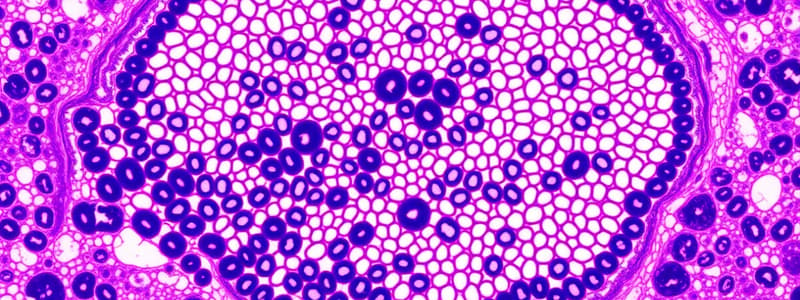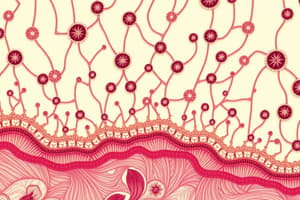Podcast
Questions and Answers
What type of cells are the deepest cells in the basal cell layer of stratified squamous epithelium?
What type of cells are the deepest cells in the basal cell layer of stratified squamous epithelium?
- Flat cells
- Columnar cells
- Squamous cells
- Cuboidal or columnar cells (correct)
Stratified cuboidal epithelium is commonly found throughout the human body.
Stratified cuboidal epithelium is commonly found throughout the human body.
False (B)
What type of epithelium lines the urinary bladder?
What type of epithelium lines the urinary bladder?
Transitional epithelium
The cells in the superficial layer of transitional epithelium may be dome-shaped or sometimes ________.
The cells in the superficial layer of transitional epithelium may be dome-shaped or sometimes ________.
Match the types of epithelium with their descriptions:
Match the types of epithelium with their descriptions:
Which of the following is NOT one of the four main basic types of tissue in the human body?
Which of the following is NOT one of the four main basic types of tissue in the human body?
Which site is NOT associated with stratified columnar epithelium?
Which site is NOT associated with stratified columnar epithelium?
Glandular epithelium is a type of modified epithelium responsible for secretion.
Glandular epithelium is a type of modified epithelium responsible for secretion.
The superficial cells in stratified squamous epithelium are polygonal in shape.
The superficial cells in stratified squamous epithelium are polygonal in shape.
Name one major function of epithelial tissue.
Name one major function of epithelial tissue.
What is the general shape of the cells in the intermediate layers of stratified squamous epithelium?
What is the general shape of the cells in the intermediate layers of stratified squamous epithelium?
The type of epithelium with more than one layer of cells is called __________.
The type of epithelium with more than one layer of cells is called __________.
Match the type of epithelium with its primary function:
Match the type of epithelium with its primary function:
Which of the following describes simple squamous epithelium?
Which of the following describes simple squamous epithelium?
Transcellular transport is a function of muscular tissue.
Transcellular transport is a function of muscular tissue.
What type of epithelium primarily lines body cavities?
What type of epithelium primarily lines body cavities?
Which type of epithelium consists of a single layer of cells that are taller than they are wide?
Which type of epithelium consists of a single layer of cells that are taller than they are wide?
Pseudostratified columnar epithelium can be found lining the respiratory tract.
Pseudostratified columnar epithelium can be found lining the respiratory tract.
What is the primary function of ciliated pseudostratified columnar epithelium?
What is the primary function of ciliated pseudostratified columnar epithelium?
Simple cuboidal epithelium is primarily found in the follicles of the __________ gland.
Simple cuboidal epithelium is primarily found in the follicles of the __________ gland.
Match the type of epithelium with its primary site of location:
Match the type of epithelium with its primary site of location:
Which of the following statements about stratified squamous epithelium is true?
Which of the following statements about stratified squamous epithelium is true?
All cells in simple columnar epithelium reach the surface.
All cells in simple columnar epithelium reach the surface.
Where is ciliated simple columnar epithelium primarily located?
Where is ciliated simple columnar epithelium primarily located?
Study Notes
Epithelium
- Covering or lining surfaces of the body or cavities within the body
- May be modified to secrete, contract, or receive stimuli
Classification of Epithelium
- Surface (covering/lining) epithelium
- Modified (specialized) epithelium
- Glandular epithelium
- Myoepithelium
- Neuroepithelium
Functions of Epithelium
- Protection of covering and lining surfaces
- Absorption
- Secretion of hormones, digestive enzymes, and mucous
- Sensation
- Contractility
- Transcellular transport
Surface (Covering) Epithelium
- Classified according to:
- Number of cell layers:
- Simple (one layer of cells)
- Stratified (more than one layer)
- Shape and height of surface cells:
- Squamous
- Cuboidal
- Columnar
- Transitional
- Number of cell layers:
Simple Squamous Epithelium
- Single layer of flattened cells with central flat nucleus and little cytoplasm
- Sites:
- Lining of body cavities (pleural & peritoneal, pericardium): mesothelium
- Blood vessels and lymph vessels: endothelium
- Lung alveoli: pneumocyte
- Bowman's capsule of kidney
Simple Cuboidal Epithelium
- Single layer of cuboidal cells with central rounded nuclei
- Sites:
- Follicles of the thyroid gland
- Tubules of the kidney
Simple Columnar Epithelium
- Single layer of columnar cells with usually basal oval nuclei located at the same level
- The cells may be:
- Ciliated
- Non-ciliated
- Sites:
- All GIT except mouth, esophagus, and anal canal
- Gall bladder
- Ciliated Columnar Epithelium:
- Respiratory tract: moves mucus and other substances via cilia
- Fallopian tube: moves egg and sperm via cilia
Pseudostratified Columnar Epithelium
- Single layer of columnar cells
- All cells arise from the underlying basement membrane
- Cells are crowded so some cannot reach the surface, and the shape of each cell is distorted
- Nuclei located at different levels give a false impression of stratification
- Can be ciliated or show goblet cells
- Ciliated pseudostratified columnar epithelium with goblet cells - Respiratory epithelium: lines respiratory tract (trachea, bronchi)
- Ciliated type without goblet cells: lines vas and epididymis
Stratified Squamous Epithelium
- Varies in thickness depending on the number of cell layers present
- May be:
- Non-keratinized: moist, lining of oral cavity, oro-pharynx, esophagus, larynx, vagina, anal canal
- Keratinized: epidermis of the skin, thicker in palms and soles
Stratified Cuboidal Epithelium
- Not common in the human body
- Two-layered cuboidal epithelium seen in the ducts of the sweat glands
Stratified Columnar Epithelium
- Not common in the human body
- Sites:
- Conjunctiva
- Main excretory duct of the large salivary glands (parotid, submandibular, sublingual)
Transitional Epithelium
- Found exclusively in the urinary passages (renal calyces and pelvis, ureter, urinary bladder): called urinary epithelium (uroepithelium)
- Shape of cells in the surface layer and the number of layers varies with the degree of distension of the organs whose lumen is lined by this type of epithelium
- Relaxed state: multiple cell layers up to 6 (basal cuboidal or columnar cells, several layers of polyhedral cells, superficial layer of dome-shaped sometimes binucleated cells)
- Distended state: up to 3 layers (one or two layers of cuboidal cells followed by a superficial layer of large, low cuboidal or squamous cells)
Studying That Suits You
Use AI to generate personalized quizzes and flashcards to suit your learning preferences.
Related Documents
Description
Explore the fundamentals of epithelium, including its classification, functions, and specialized forms. This quiz covers covering epithelium, modified epithelium types, and their various roles in the body. Test your knowledge on surface structure and cell types.




